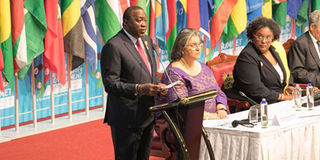Uhuru seeks to review skewed EU trade agreements

President Uhuru Kenyatta delivers his maiden address as the incoming president of the African, Caribbean and Pacific Group of States (ACP) Summit at KICC, Nairobi, on December 9, 2019. PHOTO | SAMUEL MIRING'U | PSCU
What you need to know:
- President Kenyatta said that there was need to expand the partnership to accommodate value addition of the products exported to European countries.
- President Kenyatta said climate change is the greatest threat to the future, adding that there was need to urgently address its impact.
President Uhuru Kenyatta has termed current trade agreements with the European Union as largely imbalanced.
Delivering his maiden address as the incoming president of the African, Caribbean and Pacific Group of States (ACP), he said the EU had been a long time export destination for products from the 79-member state group, but lamented the fact that the relationship has not always favoured the members.
“For a long time, our relationship has been focused on sustainable development, poverty reduction, integration of the ACP in the global economy and access to development funding, especially from the EU,” President Kenyatta said.
The ACP is holding its ninth summit at Kenyatta International Convention Centre in Nairobi.
The summit, which started Monday and ends on Tuesday, has attracted 18 heads of state, several ministers, EU representatives and other top ranking officials from member states and development partners.
Among the key issues under review at the conference are the revised agreements signed in Georgetown that created the ACP, an organisation that aims to ensure sustainable development and poverty reduction within its members.
VALUE ADDITION
Also on the list are the new agreements between the EU and the ACP, governance and economic challenges including tax evasion, the fight against money laundering and sanctions against member states including Zimbabwe.
President Kenyatta said the group’s experience in trading with the wealthy countries had been a ‘mixed’ bag.
He added that there was need to expand the partnership to accommodate value addition of the products exported to European countries.
“Our experience has so far been mixed. As the European Union continues to advocate and urge for change in the Economic Partnership Agreements with ACP member states, it is my hope that it will work with us to ensure that we secure additional development funding,” said Mr Kenyatta.
The President lamented the fact that most ACP countries’ exports to the EU consisted of primary commodities without subjecting them to value addition.
INDUSTRIAL GROWTH
This he said, resulted in trade in products that only guaranteed minimum returns for producers.
“Most countries trade in fisheries, agricultural commodities and other primary commodities with very little value addition. This exposes us to low returns and places barriers in our drive to achieve sustainable development,” he said.
The Head of State said he would use his three-year term as the ACP chair to mobilise member states to transform their economies through expanded industrial development and diversified income generating activities.
President Kenyatta said climate change is the greatest threat to the future, adding that there was need to urgently address its impact.
He also called for the strengthening of links between farmers and the various agro-based industries to generate better returns through expanded markets.
“Agriculture employs more than half of our workers, many of them poor. Value addition and integration of smallholder farmers into national and regional value chains will contribute to more inclusive development,” he said.
CLIMATE CHANGE
On her part, Barbados Prime Minister Mia Mottley said member states could only achieve their goals of transformed economies by pursuing a common agenda.
“ACP cannot be a force for good unless we all own that change. Lasting change can only come from our desire to protect our societies and the knowledge that we are not alone,” she said.
Ms Mottley said extreme weather caused by climate change had caused damage to the economies of many Caribbean nations, adding that it had resulted in the displacement of people from the region.
She appealed to EU countries to be humane in their approach towards migrants displaced by climate change, saying they were also valuable to the economies of the countries they moved to.
“Almost all our countries are reeling from impact of damage caused by extreme climate,” she said.




